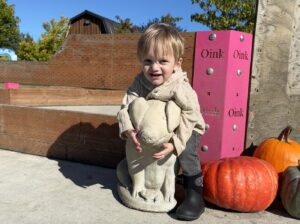It’s hard explaining my son’s Alagille syndrome diagnosis to strangers
Educating people about rare diseases is important, but it can also take a toll
Written by |

Before my son Finley was born, I had minimal exposure to the rare disease world. I knew about the more publicized conditions and had participated in a variety of fundraisers over the years. But I never expected to raise a son with a rare genetic condition, especially considering neither my wife, Dani, nor I had any family history of one. We’d never heard of Alagille syndrome before Finley’s diagnosis. Most people we encounter haven’t heard of it, either.
Since Finley was born in January 2021, I’ve found a number of ways to immerse myself in the rare disease world. Dani and I are both advocates, but we’ve found different avenues for sharing our story. Writing this column has been therapeutic, allowing me to work through many of the challenges involved in raising a young child with Alagille syndrome. Finding opportunities to open up on your terms is incredibly important.
What I still struggle with, however, is having to give impromptu explanations of Alagille syndrome.
These situations come up less often than they used to. Our family and friends all know about the condition, and the staff at Finley’s day care have a good understanding of his needs. But even though I have my elevator pitch dialed in, I can feel my internal pressure rise whenever I’m interacting with someone new.
These conversations almost always follow a similar pattern:
New acquaintance: “How old is Finley?”
Me: “He’s 3, turning 4 in January.”
New acquaintance: “Oh, he’s a little guy for his age.”
Me: “Yeah, he has a rare genetic condition called Alagille syndrome, which is a liver disease. His condition makes growth a challenge, as his body has trouble processing fats.”
New acquaintance: “Oh, wow, I’ve never heard of that before. Is there a cure?”
Me: “No, there is no cure, but we are taking every possible step to provide him with the best care. Finley is doing really well these days.”
I’ve lost count of how many interactions like the example above I’ve had. They are challenging for me, but I can’t expect people to know all about my son’s rare disease.
These conversations are always positive, and I know people mean well. Most are simply curious, or perhaps even feel guilty for commenting on his smaller size before learning about his diagnosis.
Finley is incredibly smart and can do everything his peers can physically. Alagille syndrome doesn’t hold him back, and we don’t anticipate that it will anytime soon. So how could I expect someone to know he has health issues?
I’ve found that, in asking questions, most people are hoping I’ll say that Finley’s condition is curable. This is the hardest topic for me to talk about, but I try my best to educate them in that moment.
My suggestion for those interacting with someone new is to be careful with your questions. If someone shares that their child has a rare genetic condition, ask open-ended questions that allow them to answer with as many (or as few) details as they choose to share. They are an expert on their child’s health, and certain specific questions can unintentionally bring up difficult emotions. Allow them to drive the conversation while demonstrating interest and asking relevant follow-up questions.
Early in Finley’s life, these sorts of interactions were extremely challenging, but they’ve gotten easier over the years. Time heals, and gaining more experience and knowledge allows me to better engage with people on the topic of Alagille syndrome. I hope that trend continues, and I hope our community can continue to educate the public about rare diseases.
Note: Liver Disease News is strictly a news and information website about the disease. It does not provide medical advice, diagnosis, or treatment. This content is not intended to be a substitute for professional medical advice, diagnosis, or treatment. Always seek the advice of your physician or other qualified health provider with any questions you may have regarding a medical condition. Never disregard professional medical advice or delay in seeking it because of something you have read on this website. The opinions expressed in this column are not those of Liver Disease News or its parent company, Bionews, and are intended to spark discussion about issues pertaining to liver disease.





Leave a comment
Fill in the required fields to post. Your email address will not be published.